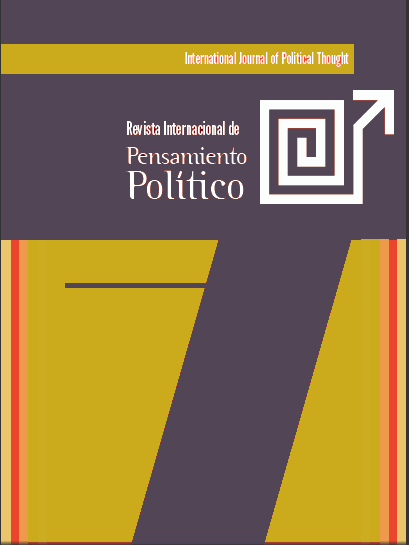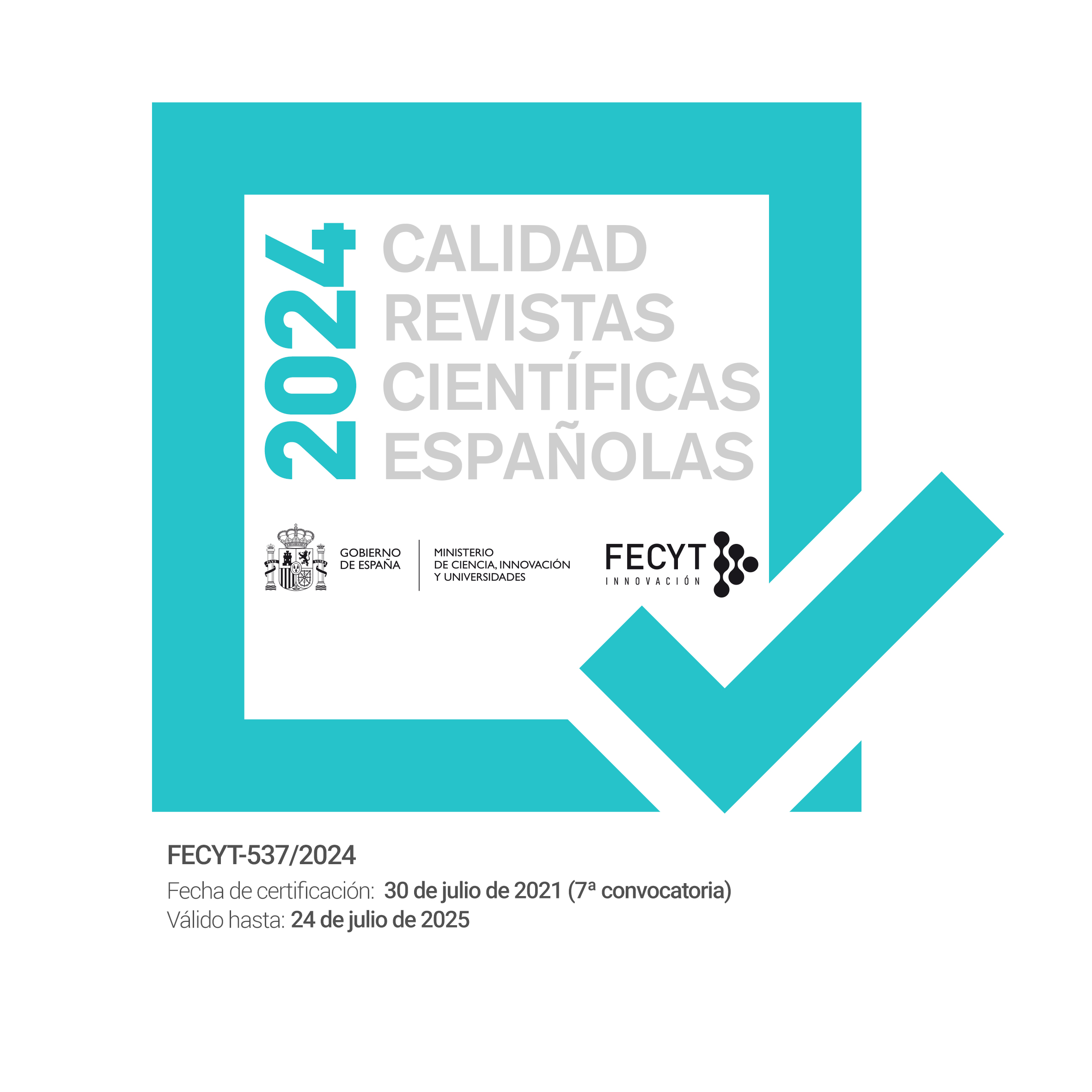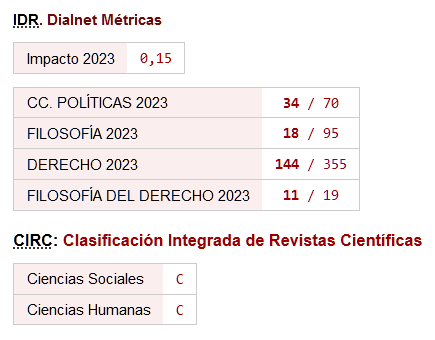Poderes deónticos y razones para actuar independientemente del deseo
DOI:
https://doi.org/10.46661/revintpensampolit.10500Palabras clave:
Política, poderes deónticos, hechos institucionales, sistema político, función de estatusResumen
Este artículo analiza la tesis searliana según la cual todo poder político representa un poder deóntico relacionado con los derechos, los deberes, las obligaciones, las autorizaciones, los permisos, la autoridad, etc. Esta concepción nos conduce a entender el poder y las funciones de estatus como un fenómeno irremediablemente vinculado a la aceptación colectiva y las reglas constitutivas. Nociones como la constitución lingüística de los poderes deónticos, las razones para actuar independientemente del deseo, la racionalidad normativa y la aceptación colectiva de los sistemas políticos, constituyen algunas de las piedras angulares que se desarrollan en este trabajo dentro de un marco conceptual cuya visión realista de lo social, institucional y político tiene importantes implicaciones en el ámbito de la filosofía jurídica, política y moral.
Descargas
Citas
Abad Cisneros, A., y Trak, J. M. (2013). Desafección política en Bolivia, Ecuador y Venezuela en 2010: un análisis comparado. Cuadernos Del Cendes, 30(82), 35-66
Ahmed, S. (2014). Cultural Politics of Emotion. Edinburgh University Press. https://doi.org/10.1515/9780748691142
Almond, G. A., y Verba, S. (1989). The Civic culture revisited. Sage Publications.
Almond, G. A., y Verba, S. (1970). La cultura cívica: estudio sobre la participación política democrática en cinco naciones.
Euramérica.
Bloch, E., Plaice, N., Plaice, S., y Knight, P. (1995). The Principle of Hope, Volume 1. MIT Press.
Clarke, H. D., Dutt, N., y Kornberg, A. (1993). The Political Economy of Attitudes toward Polity and Society in Western European Democracies. The Journal of Politics, 55(4), 998-1021. https://doi.org/10.2307/2131945
Clifford, S. (2019). How Emotional Frames Moralize and Polarize Political Attitudes. Political Psychology, 40(1), 75-91. https://doi.org/10.1111/pops.12507
Dalton, R. J. (2000). Value change and democracy. In R. D. P. Susan J. Pharr (Ed.), Disaffected Democracies: What’s Troubling the Trilateral Countries? Princeton University Press. https://doi.org/10.1515/9780691186849-015
Del-Castillo-Feito, C., Cachón-Rodríguez, G., y Paz-Gil, I. (2022). Political Disaffection, Sociodemographic, and Psychographic Variables as State Legitimacy Determinants in the European Union. American Behavioral Scientist, 66(1), 86-105. https://doi.org/10.1177/0002764220981116
Downs, A., y Merino, L. A. M. (1973). Teoría económica de la democracia. Aguilar.
Druckman, J., Green, D., Kuklinski, J., y Lupia, A. (2006). The Growth and Development Science. American Political Science Review, 100(4), 627-635. https://doi.org/10.1017/S0003055406062514
Fernández, L., y Morán, M. (2014). Encontrar la cultura: estrategias de indagación para el análisis sociopolítico. Revista de Estudios Sociales, 50, 43-56. https://doi.org/10.7440/res50.2014.07
Ferrín, M., Fraile, M., García-Albacete, G. M., y Gómez, R. (2020). The gender gap in political interest revisited. International Political Science Review, 41(4), 473-489. https://doi.org/10.1177/0192512119860260
Fraile, M., y de Miguel, C. (2022). Risk and the gender gap in internal political efficacy in Europe. West European Politics, 45(7), 1462-1480. https://doi.org/10.1080/01402382.2021.1969146
Fraile, M., y Sánchez-Vítores, I. (2020). Tracing the Gender Gap in Political Interest Over the Life Span: A Panel Analysis. Political Psychology, 41(1), 89-106. https://doi.org/10.1111/pops.12600
Inglehart, R. (2005). Modernización y cambio cultural: la persistencia de los valores tradicionales. Quaderns de La Mediterrània= Cuadernos Del Mediterráneo, 5, 21-32
Jenkins, L. (2018). Why do all our feelings about politics matter? British Journal of Politics and International Relations, 20(1), 191-205. https://doi.org/10.1177/1369148117746917
Jiménez, F. (2016). Los efectos de la corrupción sobre la desafección y el cambio político en España. In La corrupción en España (pp. 49-67). https://doi.org/10.1017/CBO9781107415324.004
Magni, G. (2017). It’s the emotions, Stupid! Anger about the economic crisis, low political efficacy, and support for populist parties. Electoral Studies, 50, 91-102. https://doi.org/10.1016/j.electstud.2017.09.014
Meer, T. W. G. Van Der. (2017). Democratic input, macroeconomic output and political trust. In Handbook on Political Trust (pp. 270-284). https://doi.org/10.4337/9781782545118.00028
Megías, A. (2018). Desafección política ¿estructura o coyuntura? : un estudio profundo en el contexto actual de crisis [Universidad de Murcia]. http://hdl.handle.net/10201/65840
Megías, A. (2020a). Changes in the nature of a decade-long crisis of disaffection. Revista Espanola de Investigaciones Sociologicas, 169, 103-122. https://doi.org/10.5477/cis/reis.169.103
Megías, A. (2020b). No es la economía, estúpido. La evolución del perfil del desafecto español pre y postcrisis. Revista Española de Ciencia Política, 52, 85-120. https://doi.org/10.21308/recp.52.04
Megías, A., y Moreno, C. (2022). Political disaffection in Spain’s European neighbours: a stable attitude? Revista Espanola
de Investigaciones Sociologicas, 179(September), 103-124. https://doi.org/10.5477/cis/reis.179.103
Megias, A. (2018). Desafección Política ¿Estructura o Coyuntura? Un Estudio Profundo en el Contexto Actual de Crisis. Universidad de Murcia.
Morán, M. L. (2011). La Cultura Política en España: interrogantes, debates y aportaciones. In UNAM (Ed.), Cincuenta años de la cultura cívica: pensamientos y reflexiones en honor al profesor Sidney Verba (pp. 101-122). Instituto de Investigaciones Jurídicas. https://eprints.ucm.es/42861/
Moreno, C., y Seisdedos, S. R. (2024). El género en el voto. In P. Oñate, J. M. Rivera, y C. Ortega (Eds.), Las elecciones generales de noviembre de 2019 (pp.173-187). Centro de Investigaciones Sociológicas (CIS).
Norris, P. (2011). Democratic Deficit: Critical Citizens Revisited. Cambridge University Press. https://doi.org/10.1017/CBO9780511973383
Nussbaum, M. (2008). Paisajes del pensamiento: La inteligencia de las emociones. Paidós. https://books.google.es/books?id=TLApnxW1VR4C
Nussbaum, M. (2014). Emociones políticas: ¿Por qué el amor es importante para la justicia? Ediciones Paidós.
Olumsuz, T., Kişilerin, D., Karar, S., y Nasil, S. (2021). How Do The Main Negative Emotions Affect People ’ s Political Decision Process ? : “Fear, Anxiety And Anger”. Journal of Academic Inquiries, 16(1), 16. https://doi.org/10.17550/akademikincelemeler.708916
Weber, C. (2013). Emotions, Campaigns, and Political Participation. Political Research Quarterly, 66(2), 414-428. https://doi.org/10.1177/1065912912449697
Wildavsky, A. (1987). Choosing Preferences by Constructing Institutions: A Cultural Theory of Preference Formation. American Political Science Review, 81(1), 3-21. https://doi.org/10.2307/1960776
Descargas
Publicado
Cómo citar
Número
Sección
Licencia
Derechos de autor 2024 Isabel Victoria Lucena Cid

Esta obra está bajo una licencia internacional Creative Commons Atribución-NoComercial-CompartirIgual 4.0.
Política de acceso abierto
Se permite el acceso libre y abierto de cualquier interesado a todos los contenidos de los números de la revista, sin costo alguno, pudiendo imprimir y trasladar todos los artículos, con la única condición de precisar la fuente y la autoría.
La revista: a) no cobra a las autorías costes por el procesamiento de los artículos ni por el envío de los mismos, b) mantiene el copyright para los autores sin restricciones, c) facilita a los autores conservar sus derechos de publicación sin limitaciones.
La Revista Internacional de Pensamiento Político es una obra original del Laboratorio de Ideas y Prácticas Políticas de la Universidad Pablo de Olavide. Todos los artículos incluidos en la Revista son obra original de sus respectivas autorías. Esta Revista se ofrece libremente a la comunidad científica y académica sin coste alguno y libera los contenidos de acuerdo a la licencia "Reconocimiento-NoComercial-CompartirIgual 4.0 CC BY-NC-SA" del proyecto Creative Commons dispuesta en la siguiente url: https://creativecommons.org/licenses/by-nc-sa/4.0/legalcode
Si deseas traducir o compilar alguno de los artículos aquí disponibles, por favor, ponte en contacto














